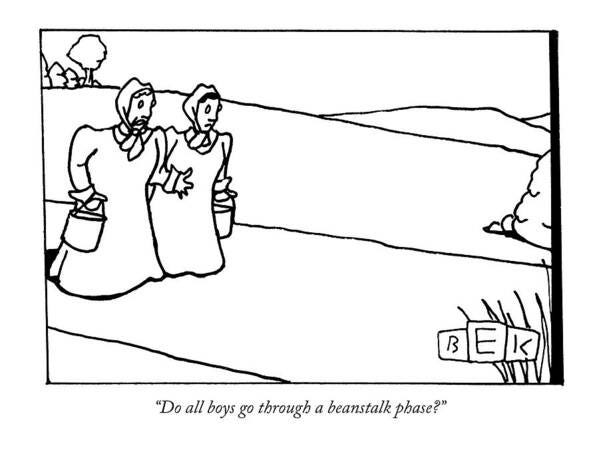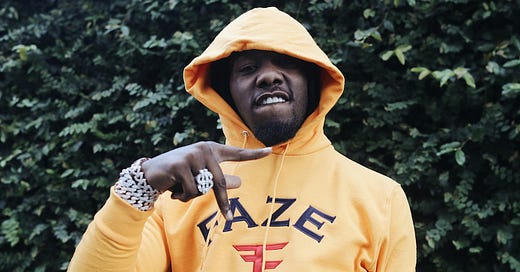Word of the week: Faze
You shouldn't confuse it with "phase," but I have grumpily come to understand why you might.
This was going to be a short entry in a future installment of Sets! My Teeth!! On Edge!!!, which is how I react to writing errors that annoy me. (Here’s the original post, in case you wish to improve my dental health.) The issue, of course, is the all-too-frequent substitution of phase for faze, as in “That didn’t *phase me at all.” It fazes me to see this error, and I was going to make damn sure everyone knew it.
But when I started digging into the history and etymology of faze I realized I had something longer and more interesting on my hands.

It’s not hard to understand why many people reach for phase when faze is called for. For one thing, phase is a lot more common.

Phase, which came into English in the 17th century from Greek phasis (“appearance”) via Latin phases (ditto), originally applied only to the phases of Earth’s moon: full, new, waning, waxing, et cetera. Around the middle of the 19th century its meaning expanded to include non-lunar appearances, aspects, and stages. The sense of “a temporarily difficult or unhappy period of personal development, esp. of adolescence” arose in the mid-19th century, and the concept of “going [or passing] through a phase” first showed up in print in 1913. (Source: OED.)

The transitive verb to phase is a late 19th-century innovation that was originally used in physics and engineering, where it meant “to adjust the phase of something” — say, an oscillation — “to make it synchronous with something else.” By 1949 people were talking and writing about phasing things in and out, although for much of the following decade the phase phrase appeared between quotation marks, indicating its novelty. Here’s a typical example from a 1955 issue of the Bulletin of Atomic Scientists: “New weapons must be ‘phased in’ gradually to our existing weapons systems.”
You can also phase up (gradually increase) and phase down (gradually decrease). I suppose something could be unphased — implemented all at once instead of gradually — but that isn’t a usage you come across very often, unless you count all the many times unfazed is misspelled.
So what about faze, then? Well, it turns out to be kind of a wonderful word.
It’s a verb, meaning “to disturb” or to “disconcert,” and it’s very much an Americanism, having first appeared in print in 1830 in the Western Monthly Review, which was published in Cincinnati when Ohio was still “the West” and not “almost the East.” (The magazine lasted all of two years, from 1828 to 1830.) The OED’s 1830 citation reads, in full: “They were too well up to these things to be fazed by a little cold lead.” I wish I could read the rest of that story, or even the rest of that paragraph.
Here’s Merriam-Webster’s etymology for faze:
Faze is a relatively new verb, first appearing in that form in the 19th century as an alteration of the now-rare verb feeze, which has the obsolete sense "to drive (someone or something) away." In the 1400s, feeze was also being used with the meaning “to frighten or put into a state of alarm.” In fact, four spellings have historically been attested for the word meaning “to disconcert or daunt”: faze, phase, feaze, and feeze. The last two of these have pretty much fallen by the wayside, while use of phase to mean faze is typically regarded as an error resulting from confusion of faze with the phase found in phase in and phase out.
Faze was, well, part of a phase: Americans in the first half of the 19th century were constantly inventing fanciful new words, especially words expressing surprise or outrageousness. This was the era that gave us bodacious (audacious, impressive), bumptious (offensively assertive), absquatulate (to leave suddenly), bunkum (nonsense; later shortened to bunk, which has given us debunk, prebunk, and rebunk), rambunctious (boisterous), discombobulate (to unsettle, and yes, I know about recombobulation), hifalutin (pretentious), and sockdolager1 (something exceptional). Merriam-Webster has a fun entry about many of these words.
I might never have discovered FaZe [sic] if I hadn’t been doing research for this post, because the story involves two subjects far outside my usual interests: e-sports and rap music.
FaZe — full name FaZe Clan — is a professional e-sports and entertainment company based in Los Angeles. It launched on YouTube in 2010 (which shows you how out of touch I’ve been all these years) as FaZe Sniping, the nom de jeu of three players who “garnered a reputation for innovating trickshotting in the game Call of Duty: Modern Warfare 2,” according to Wikipedia. I don’t understand what that means, and no, I do not wish to be gamesplained. I did do enough research to learn that despite the quirky intercap, FaZe rhymes with “plays” and not “lazy.” I also learned that FaZe Clan has more than 8.5 million subscribers and that in 2022 it became a NASDAQ-listed public company (ticker symbol: FAZE).
I also learned, if I can rely on an article published on LinkedIn by Vakada Rohit, a university student in India, that FaZe Clan took its name from the “disrupt/ disturb” sense of faze. “Their aim is to disrupt how the next generation consumes content, plays, and shops,” Rohit wrote. (The company’s founders and later leaders have all used “FaZe” in their handles: FaZe Resistance, FaZe Clipz, FaZe Temper, etc.)
There is a lot of money in playing e-sports and watching other people playing e-sports — and yes, what a weird world we live in — and some of FaZe Clan’s money has come from the American rapper known as Offset, né Kiari Kendrell Cephus, pictured at the top of this post. In August 2019 The Verge reported that Offset, “one-third of hip-hop trio Migos,” was investing an undisclosed sum in FaZe Clan: “According to the rapper, he felt an immediate kinship with the team, which is different from most other e-sports organizations.”
The story continues:
According to Offset, there’s one main unifying force linking hip-hop and e-sports. “It’s about entertainment,” he says. He also notes that there’s not necessarily a major difference between a big streamer and a music superstar. “The actual players, they’re like rock stars,” he says. “They’ve got great followings, they influence kids, and that’s what I do. It was just organic. These guys are cool.”
Is FaZe Clan a sockdolager? Is Offset full of bunkum? I have no idea. After all, I’m not the one with millions of dollars to throw at a bunch of kids going through their game phase. My job is merely to set the record straight about phase and faze. If you need a mnemonic, think of being fazed as not unlike being dazed, or like wandering through a maze. Save your phases for looking at the moon, synchronizing your oscilloscopes, and talking about your rambunctious kids.
From A Word a Day: “The word sockdolager has an unusual claim to fame in US history. It turned out to be the cue on which John Wilkes Booth fired his shot at the 16th US President, Abraham Lincoln (1809-1865), in Ford’s Theater. Lincoln was watching the play Our American Cousin and Booth, an actor himself and aware of the dialog, knew the line that brought the loudest burst of laughter from the audience was: ‘Well, I guess I know enough to turn you inside out, you sockdologising old man-trap.’ Booth fired his gun at that precise moment to muffle the loud noise of his shot with the guffaws from the audience.”




A great and enlightening essay. (Additionally, I have always blamed the confusion on Star Trek's phasers-set-to-stun. Perhaps they should have been fazers.)
Amazing that you could turn an essay about one of my most crazy-making pet peeves into a disquisition on some of my favorite words. (I had no idea it was possible to be recombobulated - how convenient!) This might be your best yet. But there's always next week.